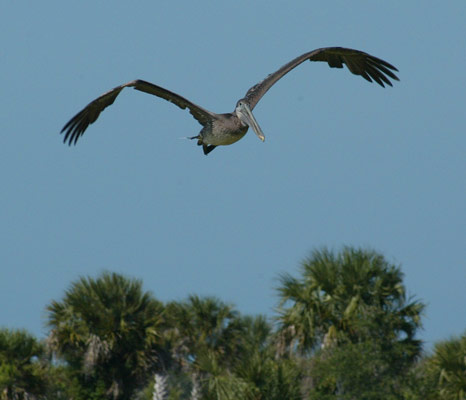
INDIAN RIVER COUNTY – Two birds caught in the Gulf of Mexico oil spill took flight today for the first time in several days as they were released at the Pelican Island National Wildlife Refuge at the northern end of the barrier island.
Pelly, a juvenile brown pelican, and Lucky, a juvenile gannet, were transported from Louisiana to Indian River County Monday, where they were released one after the other at Centennial Pond within the park off Jungle Trail. “This is one of the high points,” wildlife veterinarian Dr. Sharon Taylor said as her eyes teared up after both Pelly and Lucky were released.
Dr. Taylor could not say how many more birds would be rehabilitated and released at Pelican Island National Wildlife Refuge.
Refuge Ranger Joanna Webb said that releasing the birds at the park was bittersweet because Pelican Island was the first nationally recognized refuge.
Traditionally, birds that are rescued from catastrophe and rehabilitated are returned where they were captured. Due to the oil spill off the coast of Louisiana, the birds cannot be returned there.
“We’re trying to get them away from the oil spill,” Webb said.
Pelly was the first to be released and needed only to turn in the right direction to scoot out of his crate before taking flight. He flew low to the water, taking in his new surroundings and gaining confidence before climbing higher into the sky.
Pelly made several passes above the gathered wildlife officials and media before flying over a stand of trees toward Pelican Island itself. He was rescued on May 3.
Lucky took a little more coaxing to leave his crate, forcing Dr. Taylor and another refuge ranger to walk the container out into the water to get him to leave.
Instead of taking to the air, Lucky swam out to the middle of the pond, his head darting back and forth. He tried a couple times to fly but instead settled for the water for the time being.
“Give him a little time,” Dr. Taylor said, explaining that Lucky had been rescued on April 27, making it almost two weeks since he had last flown.
Lucky, so nicknamed by his rescuers, was 80 percent oiled, Dr. Taylor said. He was thin, dehydrated and emaciated.
His rescuers stuck a pole out toward him, which he clung to, the veterinarian said.
“I think he was very glad to see them,” Dr. Taylor said of Lucky.
Both birds were outfitted with bands for monitoring, she said.
“This is a perfect habitat for them,” Dr. Taylor said.
Webb said the area has strong populations of both brown pelicans and gannets. Wildlife officials hope both Pelly and Lucky settle in with their species. They do not expect the birds to attempt to fly “home” to Louisiana.
“All we can do is try to give them the best chance,” Webb said.
The oil spill, in the Gulf of Mexico referred to as the Deepwater Horizon spill, occurred on April 20 and currently is spewing approximately 210,000 gallons of oil daily.
Attempts to staunch the spill to date have had minimal success, according to officials.






